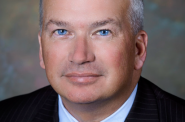The Inaugural
Marvin Pratt did not stand up with the crowd when Tom Barrett was inaugurated mayor, and the press has made a good deal of the slight. However, just after Judge Louis Butler administered the oath of office to the new mayor, Barrett’s first comments were to commend Pratt, and the former acting mayor did stand up and take a bow.
The ceremonies were held April 20th outside of City Hall in some perfectly dreadful Milwaukee spring weather. So, who was the idiot who came up with that idea? “I’m the idiot who thought to hold it outside,” fessed up Kris Martinsek. After all, the president is inaugurated outdoors in January. However, January in Washington is not nearly as unpleasant as Milwaukee in April.
The stage was set up on Wells Street, facing east. Upon the stage sat Milwaukee’s new leaders, including the mayor, the common council, the comptroller, treasurer, city attorney, city clerk and a municipal judge. Their families sat out in the street and in the adjacent park next to the Frank P. Zeidler Municipal Building.
Frank P. Zeidler was there himself, sandwiched between Marvin Pratt and Senator Herb Kohl. Kohl was dressed as he always is around here. He wore a shirt, a tie, a Milwaukee Bucks cap and a windbreaker. Except for the tie, he pretty much looked like the guy who harvests aluminum cans from my recycling bin. If he tried to walk on to the floor of the United States Senate in that getup, the sergeant-at-arms would toss him out. But this is Milwaukee, the “come as you are” capital of America, and he fit right in.
Barrett has made a list of 18 things he wants to accomplish in his first hundred days in office. I don’t know if reducing the police overtime budget is one of them, but the men in blue were certainly racking up the hours during the interminable ceremony.
The last district, the 15th, is occupied by Willie Hines, who is now the Common Council president. He then gave a big speech.
He began by saying, “my ascent to the Council Presidency is not a compromise or consolation prize for the African-American community.” This was an effective way to defuse speculation that his election was a compromise or consolation prize, and was a rather sharp thing to do. Hines also insisted that corruption will not taint his council. (We’ll check back on that in four years.) His delivery was generally quite good, and had a hint of religious fervor to it.
Moments earlier, he did have a slip up. When Valarie Hill was about to be sworn in as municipal judge, Hines said, “The City Clerk will now come to the altar – er, the podium – to take the oath.” Also, when Hines introduced the new mayor he called him “Mayor Marvin Pratt – er, Mayor Barrett.” These things happen.
The Common Council and the Mayor then held separate receptions on their respective turf. The beverages in the Common Council chambers included a vile-looking red punch, bottled water, and half pints of milk, all served with cookies. The mayor’s spread looked much the same. When Mayor John Norquist was inaugurated in 1988, the catering was by Beans and Barley, and included blue corn tortilla chips.
The Baird Buyout
As Milwaukeeworld.com recently reported in an exclusive, something indeed is going on with the management structure of Robert W. Baird & Co., Milwaukee’s old-line blue chip investment firm.
Baird president Paul Purcell announced last week that the firm will buy back majority ownership of its stock from Northwestern Mutual, which has held a stake in Baird since 1982.
Baird has already prepared proxies for those employees who are eligible to purchase stock in the company. The deal is mildly complicated, but pure Milwaukee. Baird will issue bonds for the purchase price. These bonds will all be purchased by NML. That takes care of the corporate end of the deal. Eligible employees — probably fewer than 500, to comply with securities rules for private corporations – will then be able to purchase their allotment of stock through interest-only loans from M&I Bank.
Purcell, in town for the announcement, and to attend a luncheon honoring Chas Mulcahy as the distinguished alumnus of the Marquette University College of Arts and Sciences has been telling associates that he was tired of having to subsume his company’s freewheeling culture to that of staid, plodding NML.
The cultures are quite different. NML, like most insurance companies, tries to spread its risk over as large a pool of investors as possible. It also tries to make conservative investments in things like Israel bonds, of which it is one of the principal holders.
Baird, on the other hand, deals in the volatile world of the stock market, and under Purcell has expanded its presence in ultra-risky things like Baird Capital Partners, wherein a couple of rich guys pool their assets for a throw of the dice.
Predictably, when Purcell would approach NML for authorization to try a new product, it would be kicked around for months in various committees. Often, by the time he received approval, the opportunity had passed, or the market had taken on a new dynamic.
NML agents and Baird agents had eyed each other warily over the years, with NML registered securities dealers operating variously as NML, as Baird or as both. Baird, in turn, had a contract to do the “back-office” work for Northwestern Mutual Investment Services. This created confusion, especially among agents at stand-alone Baird offices. The North Shore office of Baird, in Mequon, is a short distance from the Formala Agency of NML which, also sports a Baird logo on its sign, at least for now. Very confusing.
There is also a culture of dissension in the NML ranks, with agents and policy holders venting their opinions on every move of the company, and chairman Ed Zore.
An NML stockholder, in April 2001, predicted “with Baird management being able to load up on stock, look for NML to unload the Baird investment in the next three or four years – shortly before the contract on clearing ends, and after the next bull market has increased market values. This will fill two needs: allow aging Baird management to cash in; and allow NML to realize the growth of their investment (which they no longer need.)”
Bulls eye! Freddy Kasten will finally have the financial security to golf full-time with kings and statesmen, and Paul Purcell will be able to fully control his destiny. As for the Baird stockholders, well, they’ll be able to burn their mortgages a little sooner than expected.
A Challenge for McCann?
Could E. Michael McCann, the longest-serving District Attorney of a major metropolitan county, (since 1969) be facing an opponent this fall? Could the opponent win?
Maybe and maybe. For one thing, Vince Bobot is looking for a job. For another, McCann has not signed his pension bonus waiver, which would provide an opponent with some good ammunition.
Back in January, 2002, McCann told Jim Stingl of the Milwaukee Journal Sentinel, “I have a good pension without the lump sum. … I do not want to take something that the county board did inadvertently. … I saw those figures and said to myself, ‘this is implausible that a public pension fund could pay that.’”
At the time, McCann could have retired with an $8,600 monthly pension. Or, he could have received $4,700 per month with a $1,030,000 lump sum bonus.
If McCann decides to retire in 2005 – or if the voters do it for him – he is eligible for a pension of $9,900 per month. Since he has not signed the bonus waiver, he is also eligible to take a $5,300 monthly pension, augmented with a $1,470,000 bonus.
It is interesting that Mr. Integrity has not signed the waiver, and this would certainly become a campaign issue for Bobot or any other candidate. Right now, all we have is E. Michael McCann’s word that he would not take the extra million and a half dollars. Since we demand written waivers from other politicians, McCann’s word might not be enough for voters this fall.
Beer Wholesalers Score Big: Brewers Can’t Fire Them without Compensation
Wisconsin’s beer wholesalers will be compensated any time they lose a customer to another distributor, according to a law enacted on April 20th and signed by Governor Jim Doyle. Now, the brewers are calling “foul,” saying the bill was slipped right past them. According to 2003 Wisconsin Act 303, “a successor wholesaler shall compensate a terminated wholesaler for the fair market value of the terminated wholesaler’s distribution rights to any discontinued brand of fermented malt beverages.” Payment must be made within 30 days.
The act was the result of efforts by the Wisconsin Beer Distributors Association, Inc. and was lobbied by Bill Broydrick. The breweries, apparently, were caught off guard. “Nobody got a phone call from their state representatives on this one,” said Lakefront Brewery president Russ Klisch.
The act got its start when Stevens Point Brewery pulled its business from five distributors without compensation. This energized the distributors, and four days before the end of the legislative session, Senate Bill 489 was introduced with little fanfare, and the lobbyists were off and running. The law was passed on a voice vote and signed April 20th. Rep. Leon Young called it “the Point Bill.”
A delegation of Wisconsin brewers hastily arranged a meeting to discuss the bill with Governor Jim Doyle in the Capitol.
The governor told the brewers, including Russ Klisch of Lakefront Brewery, Randal Sprecher of Sprecher Brewery and representatives of Stevens Point Brewery that late-in-the-session bills often were the product of special interest lobbying, and that he would veto the bill – provided the brewers could guarantee it would not be overridden. How’s that for putting first things first!
Although the bill will not have an impact on brewers with good relationships with their distributors, it does seem to limit trade and competition, since it removes an incentive – the possible loss of a contract – from the wholesalers.
Brewers in the past have switched distributors for a variety of reasons, some downright nasty. Smaller brewers often felt that their distributors paid more attention to the much larger national breweries with their considerable advertising and marketing power. Stevens Point Brewery, for example, has seen its revenues increase over 15 per cent since it switched distributors.
According to Russ Klisch, “I am happy with Beer Capitol, my distributor, so I’m fine. But the law seems to discourage new breweries looking for a distributor. If you’re going to open a brewery, you better make the right choice of distributor in the beginning, since it looks like you’ll be stuck with them indefinitely.”
By requiring a successor distributor to compensate the terminated wholesaler for the fair market value of the distribution rights, the law would place the successor company at a potential competitive disadvantage. As a practical matter, the payment to the discontinued wholesaler would come from the brewery.
[inarticle ad=”UM-In-Article-2″]The wholesalers point out that their business is very capital intensive, and that if brewers could capriciously terminate relationships without compensation, they could incur heavy losses.
This is particularly true in the case of the few remaining large brewers like Anheuser Busch, SAB Miller and Coors.
But many of Wisconsin’s breweries are far smaller – Lakefront’s production is only 4,000 barrels – and have little recourse if their chosen distributor fails to promote their product.
Matters are complicated by a new trend of giant firms like Anheuser Busch to demand exclusivity from their wholesalers.
Interestingly, although a brewer may have an exclusive contract with a distributor, state law prohibits similar contracts on the retail level.
According to 125.33(10) of Wisconsin statutes, “no brewer or wholesaler may enter into any agreement whereby any … class “B” licensee or permittee is required to purchase the fermented malt beverages of any brewer to the exclusion of those manufactured by other brewers.”
With the specter of distributors increasingly paying attention to their largest customers, and suffering little consequence from ignoring their smaller customers, the future of smaller breweries seems imperiled by the act.
A possible fix would be to exclude from the act brewers below a certain production level. Other aspects of the state’s liquor laws include such exclusions, one for brewers manufacturing less than 30,000 barrels per year, and another that excludes brewers manufacturing less than 300,000 barrels per year from its provisions.
But for now, if you want to start a brewery, you better find the perfect distributor right off the bat, or else you’ll pay for it.
Like Father, Like Son: Ald. Michael McGee, Jr.
Newly inaugurated Alderman (6th) Michael McGee, Jr. thanked his mother in his inaugural address, which was fine. Then he went on: “a lot of people think my father just hatched me. … My father is not the criminal people think he is. So don’t say he’s Saddam Hussein and I’m Saddam Hussein, Jr. We don’t play that.” McGee also modestly complimented his uncle Al Stewart saying, “he made me into the champion I am today.” McGee, who considers himself to be a “political entrepreneur,” gave the audience at the inaugural a sense of his legislative priorities. “We have to address the transatlantic slave trade.” Won’t this be a fun four years?
Come ‘n’ Get It!: Unclaimed Property Time is Here
Once a year State Treasurer Jack Voight buys a run of newsprint to announce thousands of names of individuals and corporations with unclaimed property, along with coupons to redeem your forgotten assets. The amount unclaimed in Wisconsin is $160 million, so the list is worth a look.
Since he is the State Treasurer, and not State Detective, we may forgive Voight for not tracking down some readily identifiable names on the list, which always includes a few surprises, but never seems to include your own name.
“Property becomes unclaimed when there has been no owner activity related to the financial asset for a period of five years and when the owner cannot be contacted by the holder of the asset,” according to the treasurer.
It appears the holders of the assets don’t do a lot of detective work themselves, since NML is listed as having five abandoned accounts, and its subsidiary Robert W. Baird has 13. Security Bank has six accounts out there, while Blunt Ellis & Loewi has eight, and its successor Kemper Clearing Corporation has 27, which makes you wonder what Bank of New York Clearing, which bought the above firms, was doing before it closed up shop at 111 E. Kilbourn Ave., the address clearly listed in the publication. Sheldon and Lori Gendelman have 8 accounts that should probably be going to Democrats in the form of a campaign contribution rather than languishing in the treasurer’s safe deposit box. Likewise, the Royal Taxman Trust, Karah Moreno Taxman and Dyllan Moreno Taxman could probably use their money when it comes time to pay the other tax man.
James Weichmann has been so busy running Stevens Point Brewery that he is probably unaware of the money waiting for him, and William C. Brumder is setting a bad example for River Hills residents generally by letting his cash sit idle. The Friends Meeting House could spend more time quakering and less time passing the collection plate if it claimed its funds. Marquette University has three, and even Foley & Lardner has a languishing account, hopefully not from your trust fund.
Some accounts seem to be typographically-challenged, like the “Revocable Hilda D.”
Most shockingly, money is sitting idle at a company accustomed to squeezing every dime – Wisconsin Gas and Wisconsin Electric Power Company left behind 10 accounts when they merged as WE Energies.
Are you on the list? Find out at www.ost.state.wi.us.
Political Contributions Tracker
Displaying political contributions between people mentioned in this story. Learn more.
- December 1, 2020 - Tom Barrett received $250 from Russ Klisch
- July 1, 2019 - Vincent Bobot received $250 from Jim Weichmann
- December 31, 2018 - Tom Barrett received $100 from Kris Martinsek
- September 8, 2018 - Tom Barrett received $200 from Kris Martinsek
- July 10, 2018 - Tom Barrett received $200 from Kris Martinsek
- June 25, 2018 - Tom Barrett received $220 from Russ Klisch
- November 13, 2017 - Tom Barrett received $150 from Kris Martinsek
- September 14, 2017 - Tom Barrett received $50 from Vincent Bobot
- September 11, 2017 - Tom Barrett received $100 from Kris Martinsek
- June 29, 2017 - Tom Barrett received $1,000 from Herb Kohl
- June 21, 2017 - Tom Barrett received $400 from Russ Klisch
- May 25, 2017 - Tom Barrett received $150 from Kris Martinsek
- April 2, 2016 - Tom Barrett received $1,000 from Bill Broydrick
- March 3, 2016 - Tom Barrett received $5,000 from Herb Kohl
- December 28, 2015 - Tom Barrett received $400 from Kris Martinsek
The Roundup
-
Conservative Power Rises in Senate
 May 18th, 2015 by Steven Walters
May 18th, 2015 by Steven Walters
-
Buffett Tour on Hold
 Jun 27th, 2005 by Michael Horne
Jun 27th, 2005 by Michael Horne
-
Museum’s Wish List
 Jun 20th, 2005 by Michael Horne
Jun 20th, 2005 by Michael Horne




















